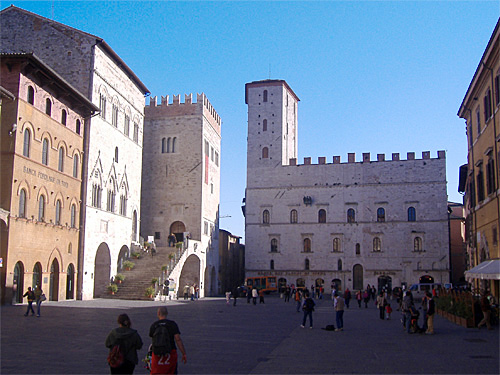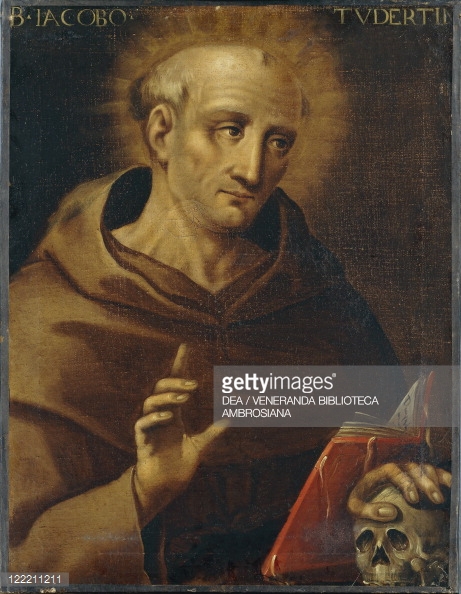I LOVE BEING MARRIED!!!! Let me repeat, I love being married!!! It requires I grow everyday. That’s definitely not a comment about Kelly. It is infinitely a comment about me. Thank you. Thank you. Thank you, Kelly. Thank you for saying “yes” or “sure”, or whatever it was. Thank you for being Mrs. McCormick. Thank you for being Mara’s “Omi”. I love you very much. You know how I feel.
Jacomo, or James, was born a noble member of the Benedetti family in the northern Italian city of Todi. He became a successful lawyer and married a pious, generous lady named Vanna. His young wife took it upon herself to do penance for the worldly excesses of her husband. One day Vanna, at the insistence of Jacomo, attended a public tournament. She was sitting in the stands with the other noble ladies when the stands collapsed. Vanna was killed. Her shaken husband was even more disturbed when he realized that the penitential girdle, or hairshirt, she wore was for his sinfulness. On the spot, he vowed to radically change his life.
He divided his possessions among the poor and entered the Secular Franciscan Order. Often dressed in penitential rags, he was mocked as a fool and called Jacopone, or “Crazy Jim,” by his former associates. The name became dear to him. On another occasion, he appeared at a wedding in his brother’s house, tarred and feathered from head to toe.
After 10 years of such humiliation, Jacopone asked to be a member of the Order of Friars Minor. Because of his reputation, his request was initially refused. He composed a beautiful poem on the vanities of the world, an act that eventually led to his admission into the Order in 1278. He continued to lead a life of strict penance, declining to be ordained a priest. Meanwhile he was writing popular hymns in the vernacular.
Jacopone suddenly found himself a leader in a disturbing religious movement among the Franciscans. The Spirituals, “Fraticelli”, as they were called, wanted a return to the strict poverty of Francis. They had on their side two brothers, the Colonnas, cardinals of the Church, and Pope Celestine V. Interestingly, Celestive resigned before action could be taken. These two cardinals, though, along with the King of France, opposed Celestine’s successor, Boniface VIII, who opposed the more ascetic approach. During the struggle that followed, Jacopone publicized the Spirituals’ cause by writing verses highly critical of their opponents, the Pope included. A battle between the two factions ensued, ending in the siege of Palestrina.
At the age of 68, Jacopone was excommunicated and imprisoned. Although he acknowledged his mistake, Jacopone was not absolved and released until Benedict XI became pope five years later in 1303, having been specifically excluded from the Jubilee Year of 1300 by papal bull. He had accepted his imprisonment as penance. He spent the final three years of his life more spiritual than ever, weeping “because Love is not loved.” During this time he wrote the famous Latin hymn, Stabat Mater.
On Christmas Eve in 1306 Jacopone felt that his end was near. He was in a convent of the Poor Clares with his friend, Blessed John of La Verna. Like Francis, Jacopone welcomed “Sister Death” with one of his favorite songs. It is said that he finished the song and died as the priest intoned the Gloria from the midnight Mass at Christmas. From the time of his death, he has been venerated as a saint. He is praised in Dante’s Paradiso.

-The Piazza del Popolo in Todi, where Jacopone crawled around on one occasion, wearing a saddle.
Some of his poetry,
From “Love That Is Silent”:
Love, silent as the night,
Who not one word wilt say,
That none may know Thee right!
0 Love that lies concealed,
Through heat and storm and cold,
That none may guess nor read
Thy secrets manifold;
Lest thieves should soon grow bold
To steal away thy treasure,
Snatch it and take to flight
Deep-hid, thy secret fires
More ardently shall glow;
And he who screens thee close,
Thy fiercest heat shall know.
From “The God-Madness”:
Does it remain itself, unchanged?
It is as if it never existed.
So it is with the soul: Love drinks it in,
It is united with Truth,
Its old nature fades away,
It is no longer master of itself.
The soul wills and yet does not will:
Its will belongs to Another.
It has eyes only for this beauty;
It no longer seeks to possess, as was its wont–
It lacks the strength to possess such sweetness.
The base of this highest of peaks
Is founded on nichil,
Shaped nothingness, made one with the Lord.”
From “The Soul’s Over-Ardent Love”:
Love, that art Charity,
Why has Thou hurt me so?
My heart is smote in two,
And burns with ardent love,
Glowing and flaming; refuge finding none,
My heart is fettered fast, it cannot flee;
It is consumed, like wax set in the sun;
Living, yet dying, swooning passionately,
It prays for strength a little way to run,
Yet in this furnace must it bide and be:
Where am I led, ah me!
I once could speak, but now my lips are dumb;
My eyes are blind, although I once could see:
In this abyss my soul is stark and numb,
Silent I speak; cling, yet am held by Thee:
Falling, I rise; I go, and yet I come;
Pursue, and am pursued; I am bound yet free;
O Love that whelmeth me!
Maddened I cry:
“Why must I die,
They fiery strength to prove?”
Love, Love, of naught but Love my tongue can sing,
Thy wounded Hand hath pierced my heart so deep:
Love, Love, with Thee made one, to Thee I cling,
Upon Thy breast, let me sleep;
Love, Love, with Love my heart is perishing;
Love, like an Eagle snatching me Thy sleep,
For Thee I swoon, I weep,
Love, let me be,
By courtesy,
Thine own in death. . .
From “Rapture Divine”:
When the mind’s very being is gone,
Sunk in a conscious sleep,
In a rapture divine and deep,
Itself in the Godhead lost:
It is conquered, ravished, and won!
Set in Eternity’s sweep,
Gazing back on the steep,
Knowing not how it was crossed –
To a new world now it is tossed,
Drawn from its former state,
To another, measureless, great,
Where Love is drowned in the Sea.
The Stabat Mater
At the cross her station keeping,
Stood the mournful Mother weeping,
Close to Jesus to the last.
Through her heart, His sorrow sharing,
All His bitter anguish bearing,
Now at length the sword had pass’d.
Oh, how sad and sore distress’d
Was that Mother highly blest
Of the sole-begotten One!
Christ above in torment hangs;
She beneath beholds the pangs
Of her dying glorious Son.
Is there one who would not weep,
Whelm’d in miseries so deep
Christ’s dear Mother to behold?
Can the human heart refrain
From partaking in her pain,
In that Mother’s pain untold?
Bruis’d, derided, curs’d, defil’d,
She beheld her tender child
All with bloody scourges rent.
For the sins of His own nation,
Saw Him hang in desolation,
Till His spirit forth He sent.
O thou Mother! fount of love!
Touch my spirit from above;
Make my heart with thine accord.
Make me feel as thou hast felt;
Make my soul to glow and melt
With the love of Christ our Lord.
Holy Mother! pierce me through;
In my heart each wound renew
Of my Saviour crucified.
Let me share with thee His pain,
Who for all my sins was slain,
Who for me in torments died.
Let me mingle tears with thee,
Mourning Him who mourn’d for me,
All the days that I may live.
By the cross with thee to stay,
There with thee to weep and pray,
Is all I ask of thee to give.
Virgin of all virgins best,
Listen to my fond request
Let me share thy grief divine.
Let me, to my latest breath,
In my body bear the death
Of that dying Son of thine.
Wounded with His every wound,
Steep my soul till it hath swoon’d
In His very blood away.
Be to me, O Virgin, nigh,
Lest in flames I burn and die,
In His awful Judgment day.
Christ, when Thou shalt call me hence,
Be Thy Mother my defense,
Be Thy cross my victory.
While my body here decays,
May my soul Thy goodness praise,
Safe in Paradise with Thee.
Amen.
-Blessed Jacopone da Todi
Epitaph: “Here lie the bones of Blessed Jacopone dei Benedetti da Todi, Friar Minor, who, having gone mad with love of Christ, by a new artifice deceived the world and took Heaven by violence.”
Blessed Nativity.
Love,
Matthew


